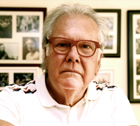It’s been years in the writing, editing and legalling, but finally Evil Life: The True Story of the Calabrian Mafia in Australia reaches bookshops today.
The 356-page book co-authored by former NSW Police assistant commissioner Clive Small and author Tom Gilling is the most complete account of murders, drug trafficking and cannabis crop growing by the Australian offshoot of the Italian mafia.
All the fabled characters and criminal events are recorded, chapter and verse: “Aussie” Bob Trimbole, the Mr Asia syndicate, the assassinations of Labor MP John Newman, Federal Police assistant commissioner Colin Winchester and Griffith anti-drugs campaigner Donald Mackay, the role of Cabramatta overlord Phuong Ngo and Judge John Foord. The bibliography alone covers four pages.
The Italian mafia in Australia had many noms de guerre: La Cosa Nostra, the Camorrra, The Black Hand, L’Onorata Societa and the ‘ndrangheta. Another name, Evil Life, was coined by Calabrian migrant Domenico Belle, who arrived here in 1923 to embark on a criminal career of murder, extortion and arson.
This will be compulsory reading for true crime junkies, serving and retired police, ditto politicians from all parties, crime reporters, lawyers, judges and magistrates.
Small sprang into public prominence for his role in the capture of backpacker serial killer Ivan Milat in 1994 and in establishing the innocence of superintendent Harry Blackburn, who was wrongly charged with multiple rape offences.
In 2002 he lost his bid to succeed police commissioner Peter Ryan, and his nemesis, Ken Moroney, refused to renew his contract of employment after settling into the commissioner’s chair.
After a spell as executive director of operations at the Independent Commission Against Corruption, which ended in 2007, Small devoted himself to research and writing.
His former police colleagues took strong exception to his burgeoning media profile, while some journalists started to regard him as a “show pony”, although they regularly relied on him for expert opinions.
In my opinion, Small was hounded out of his police career bypoliticians and right-wing media figures, and now he is getting even.
His Calabrian mafia book contains documentary proof that senior police, politicians and criminal justice officials turned a blind eye to the influence of illegal drug networks. Even those who were caught were either acquitted on appeal or paroled after serving only half or less of their sentences.
The number of convicted offenders who were released in order to pursue their criminal ways is a theme that is repeated on page after page.
For example: Rosario Zirilli was sentenced to life in jail for a Sydney murder but served only eight years before being released. Returning home to Italy, he was killed by the mafia. In 1975 Agazio Daniele was cleared of murder but found guilty of manslaughter and sentenced to 12 years’ jail. Released after five years, Daniele avoided being returned to Italy when his appeal to the Administrative Appeals Tribunal revoked his deportation order.
Another recurring theme in the book is the utter failure of the Immigration Department to enforce criminal checks on known mafiosi making applications to migrate to Australia. The book quotes recommendations calling for tougher probity checks to weed out applicants with criminal records, but they were dismissed as “racist” or contrary to “multiculturalism”.
There is no doubt that the police and media have an unhealthy interest in ethnic communities and their overt racial profiling tarnishes the reputation of whole communities.
Beating up on the Italian mafia was once considered a path to promotion in the National Crime Authority and the Australian Federal Police, and it was bread and butter to newspapers and TV stations.
However, in recent years previous phobias about Italians as well as Greeks, Turks, Vietnamese and Chinese have been replaced by rampant Islamaphobia, particularly in the police and press.
Don’t get me wrong; Small and Gilling’s book is an invaluable work of social history, but I yearn for the day when law enforcement also turns its attention to the bankers, developers, gaming tsars, money launderers and tax evaders who are robbing the country blind.








You neglected to mention politicians in the last sentence
There is no doubt that corruption is rampant in Australia and it has always been so, insider traders and financial advisers should also be on the list.
We like corruption in Cambodia because it works for all of us, a dollar to the police suffices for any offence. The tax collector used to be happy for some petrol for his motorbike.
Or if one was doing very nicely twenty bucks a month.
Had media entities, including, Crikey, made a genuinely serious effort to expose what was happening the outcomes would have been better and come sooner.
Better late than never is an apt comment, isn’t it.
Flattie – I’d be happy if they concentrated JUST on the pollies since it is they who are the root cause of so much evil.
In 1947, my father, a NSW Police detective constable was transferred to Griffith where he served for 7 years. Very quickly he reported the activities of the local Calabrian Mafia to superiors in Sydney. Persisting even after being ignored he received a telephone call from HQ. ‘Stop barking.’
I went to school with many of these later generation Commora leaders.
Everybody in town knew what was going on but they operated with full government approval.
I laugh when people talk of political corruption in foreign countries. This is the real world folks. Money.